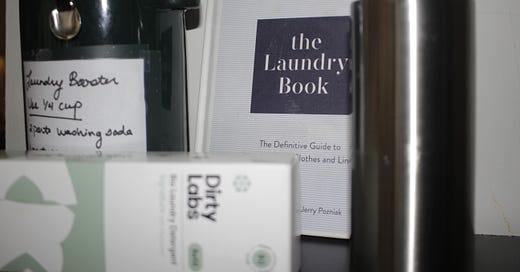To me, the question of crunchy identity can be distilled to the matter of deodorant. Aluminum-free, coconut-oil based, Secret, none of that matters. If your pits smell like daisies, you are a member of the civilized set. For most people, forgoing deodorant would mean smelling bad for a time, and regardless of any promises about a naturally odorless future, this would be unacceptable.
The crunchy lifestyle has been dressed up in linen milkmaid dresses and filtered through rose-tones, but the authentic variety is actually quite repulsive, socially and otherwise. There’s a reason the term “hippy” was traditionally preceded by “dirty.” Striving for high-level wellness means, at least on occasion, eliciting disgust from polite society. Remember the pee-drinkers?
Although I like to save the details of my deodorant status for close friendship, if not marriage, I’m happy to confess to preferring my teeth brushed and my hair washed. I enjoy having friends and being invited to functions, so in all things alternative, I aim for balance. My guiding principle is to be as natural and holistic as I can be without disturbing the fabric of my various social ecosystems.
In that spirit, it’s time we all admit that homemade laundry detergents do not work. At all. I committed to an honest attempt at using them for years. In the hours following my son’s birth, I didn’t have enough lucidity to keep myself from accidentally sending to at least two people a picture of my son that also featured my bare boob, but I did confidently tell my homebirth midwife, “2 scoops” when she stared, puzzled, at my jar of baking soda, washing soda, citric acid, and borax with used towels in her arms. It was important to me.
I tried variations with Epsom salt and a vinegar rinse. I tried hot and cold water washes. At one point, I tried doing all of our laundry without a washer or dryer. It was just me, a washboard, the bathtub, and some temporary rotator cuff damage. Eventually, I admitted that I needed to find a better way, one that would make our clothes feel fresh and smell nice without clogging my family’s pineal glands, or something.
If I fail at a domestic task, I like to read about how people who do that task professionally approach it. So for my birthday, I asked for and received, “The Laundry Book: The Definitive Guide to Caring for Your Clothes and Linens” by Zach Pozniak and Jerry Pozniack. It’s an ongoing joke between my husband and me that by buying things I ask for, his gifts are always trad vs rad fem discourse fodder. One Christmas he gave me a vacuum cleaner and a Bible.
In “The Laundry Book,” the Pozniacks, a father and son team of dry cleaners, explain that what makes an effective laundry detergent, but is often missing from even commercial formulas, is enzymes. Without enzymes, biomaterial can be “washed” out of clothes but is not fully broken down and will leave residue. After a little searching, I found an enzymatic detergent with an Environmental Working Group verification.
Dirty Labs Bio Laundry Detergent is a yuppie crunchy dream. It works well and the magnolia, cedar, and bergamot scent, which they call “Signature,” smells like a traditional laundry detergent without the artificiality of Gain or Tide that makes my stomach hurt and reminds me of digging beer bottle caps out of college dryer lint filters when I was an RA.
It’s expensive, about thirty dollars for twenty-two fluid ounces, but you don’t need much because it’s highly concentrated. My first bottle lasted five months. The packaging is sustainable, which means annoying, so I keep mine in a stainless steel pump bottle, and put two pumps in the main detergent dispenser and one in the pre-soak dispenser.
A few other tips I picked up from “The Laundry Book”:
Use a laundry sorting cart
I divide our laundry by dark, lights, and delicates that can’t go through the dryer. Ideally laundry should be sorted by color and weight, but we all make our compromises.
Read your washing machine manual
I found out mine has a pre-soak cycle and a delayed start feature, which is nice for putting one load in before bed to start washing as I am waking up, so it’s ready to flip after I make the morning coffee.
Homemade detergents do make great boosters.
The Pozniack’s recipe for a laundry booster, that I also make and use, is one-part washing soda, one-part baking soda, one-part borax, and one-part sodium percarbonate. Put 1/4th a cup of this directly into the washer’s tub with the clothes. This increases the pH of the water and helps detergent work better.
Use wool dryer balls.
They genuinely reduce drying time and wrinkles. It’s also nice to add essential oils to them for additional perfuming. I like the Deodorizer blend from Plant Therapy.
Take clothes out of the dryer when they are the tiniest bit damp.
Like hair, clothing stays in the best conditions when it’s not heated to a crisp. Ideally, you should take clothes out immediately and hang them up to finish drying. That’s a high bar, so again, read your dryer manual. Some have the option to program the barrel to occasionally roll after a cycle to keep slightly-damp clothes from sitting idle for too long. If I’m busy, I try to spread them out on the bed until I can put everything away.
Lest you feel I’ve resorted to writing ad copy for soap out of boredom, the significance of doing laundry with a mind for health is larger than a single detergent. The crunchy movement is right about a lot of things, important things. But it’s burning people out. I’d like to see it hold and gain ground in the fight against the environmental and medical corruption that continues to harm us and our loved ones. But in order to do that, we should champion methods of being well without being threateningly weird.


